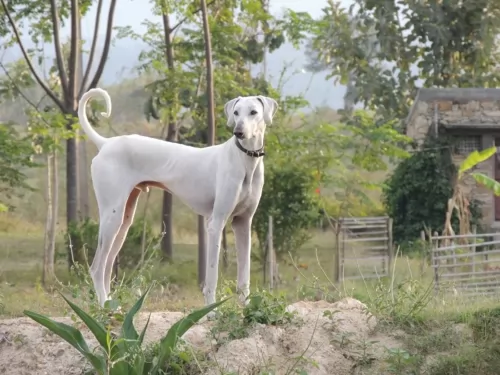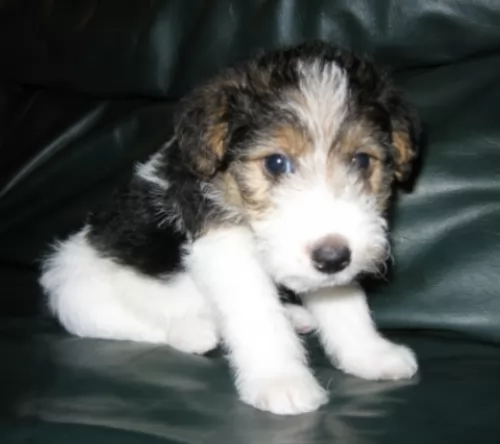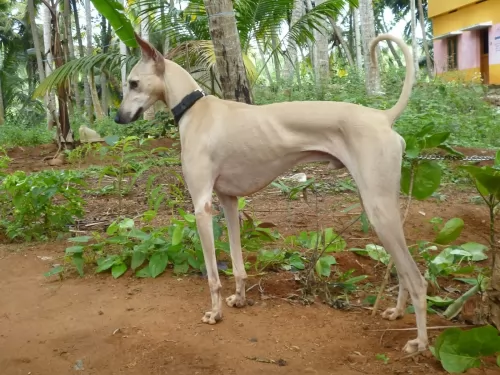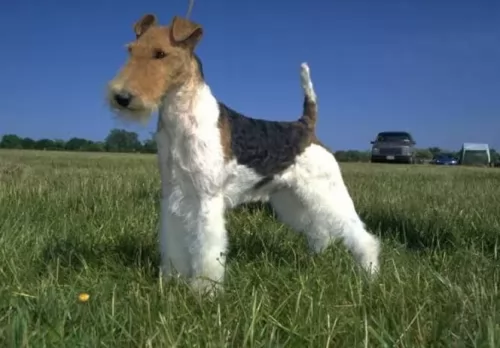 Petzlover
Petzlover Chippiparai is originated from India but Wire Haired Fox Terrier is originated from United Kingdom. Chippiparai may grow 25 cm / 10 inches higher than Wire Haired Fox Terrier. Chippiparai may weigh 11 kg / 25 pounds more than Wire Haired Fox Terrier. Both Chippiparai and Wire Haired Fox Terrier has almost same life span. Both Chippiparai and Wire Haired Fox Terrier has same litter size. Chippiparai requires Low Maintenance. But Wire Haired Fox Terrier requires Moderate Maintenance
Chippiparai is originated from India but Wire Haired Fox Terrier is originated from United Kingdom. Chippiparai may grow 25 cm / 10 inches higher than Wire Haired Fox Terrier. Chippiparai may weigh 11 kg / 25 pounds more than Wire Haired Fox Terrier. Both Chippiparai and Wire Haired Fox Terrier has almost same life span. Both Chippiparai and Wire Haired Fox Terrier has same litter size. Chippiparai requires Low Maintenance. But Wire Haired Fox Terrier requires Moderate Maintenance
 The Chippiparai is a working dog found in India and until recently there has been little interest in the purity of any breed, but rather only an emphasis on the abilities of the dog. They are only beginning to research the origin and history of their native dogs such as the Chippiparai. Not much is known about the origin of the breed except that it is found almost exclusively in Tamil Nadu and Keraia in the southern part of the subcontinent of India. Other than this there is much speculation about the breed’s origin but very little-known facts. It is indeed an ancient breed; however, its origin could be thousands of years ago or simply hundreds of years ago.
The Chippiparai is a working dog found in India and until recently there has been little interest in the purity of any breed, but rather only an emphasis on the abilities of the dog. They are only beginning to research the origin and history of their native dogs such as the Chippiparai. Not much is known about the origin of the breed except that it is found almost exclusively in Tamil Nadu and Keraia in the southern part of the subcontinent of India. Other than this there is much speculation about the breed’s origin but very little-known facts. It is indeed an ancient breed; however, its origin could be thousands of years ago or simply hundreds of years ago.
• Perhaps it is a descendant of the Saluki as it resembles this breed quite a bit. It has been believed for some time that the Saluki is the original sighthound and the source of all sighthound breeds. The Saluki was very popular in the Middle East, especially in Persia and Arabia from which it could easily have spread to India. It would then have been shared from Northern India to Southern India where the Chippiparai is found.
• Perhaps the Chippiparai is a descendent of sighthounds from Central Asia and Afghanistan – the Tazi, Taigan, Hortaya Borsaya or the Afghan Hound. This part of Central Asia had more trade, influence and contact with the Indian subcontinent early in their history than with any other region. The Chippiparai is considered by some to be more like these sighthounds than like the Saluki and the interaction between these regions has a much longer history than the Middle East and India.
• It is also speculated that the Chippiparai might have been developed completely and uniquely from the local street and working dogs. With the civilization of India being one of the oldest in the world, it is considered a possibility that the Chippiparai is the descendent of the Harappan hunting dogs that probably were developed by the Indus Valley or Harappa roiling class.
Wherever the Chippiparai came from, they were the exclusive property of the wealthy and ruling castes. These upper castes were the only ones that could legally hunt with dogs or afford to feed one. The royal classes of Tiruneivell, Thanjavur, and Madurai all fed the popularity of the breed among the upper castes. They were coursing dogs used to chase down the prey once it was sighted. The Chippiparai are incredibly fast runners and would catch almost any prey and either hold it or kill it for their hunter. The Chippiparai, when not hunting, had to be chained so they would not chase any small animal that they saw. This confinement also added to the purity of the breed as random breeding was prevented.
The southern part of the Indian subcontinent is extremely hot with routine temperatures over 100’. The Chippiparai was developed to withstand these extreme temperatures and is more heat tolerant than most any other breed. They also need very little food and are resistant to the many parasites and diseases found in southern India.
Harboring the belief that Indian dogs were not as good as European ones, the occupying countries of Portugal, France, and Britain, had no interest in the Chippiparai, again leaving the breed to develop naturally on their own with little or no interbreeding. They also received no formal recognition because Indian culture only valued the dog for its working abilities. There was no Indian Kennel Club until 1956.
The Chippiparai is now very rarely and only found in the area of its birth. Many believe the breed is in danger of becoming extinct and even though it is now registered with Indian Kennel Clubs it is not often shown in their dog shows. Lovers of the breed are now attempting to get Indians to recognize that the Chippiparai is a great companion animal and attempting to save the breed.
 The Wire Haired Fox Terrier originates in England, and it is thought that the dog developed from the white English Terrier being crossed with the Bull Terrier and maybe even the Beagle.
The Wire Haired Fox Terrier originates in England, and it is thought that the dog developed from the white English Terrier being crossed with the Bull Terrier and maybe even the Beagle.
The hunting crowd wanted a dog that was small enough to disappear down a hole to flush out a fox.
Even though the Wire Haired Fox Terrier used to be a pet of Queen Victoria as well as King Edward VII, it only became popular as a family pet in the 1930s.
 The Chippiparai is a typical sighthound although their size and appearance will vary more than that of registered purebred sighthounds. Typically, they will have a long, domed head with small erect ears and dark eyes. Their muzzle will be as deep and wide as the skull but longer. Their legs are straight and long, their chest is roached back and deep, giving them, an appearance very similar to a greyhound or other sighthound.
The Chippiparai is a typical sighthound although their size and appearance will vary more than that of registered purebred sighthounds. Typically, they will have a long, domed head with small erect ears and dark eyes. Their muzzle will be as deep and wide as the skull but longer. Their legs are straight and long, their chest is roached back and deep, giving them, an appearance very similar to a greyhound or other sighthound.
They have a long curly tail, and their coat can vary greatly in color. They are medium sized, and their coat is short, shiny and close. He is very slender and sleek, which along with his long legs gives him that incredible speed. They are thin with visible ribs.
 The Wirehaired Fox Terrier is a medium-sized dog, standing at between 33 and 38cm in height and weighing between 6 and 9 kg.
The Wirehaired Fox Terrier is a medium-sized dog, standing at between 33 and 38cm in height and weighing between 6 and 9 kg.
The face is fairly long and he has semi-erect, semi-floppy ears and the high set tail is usually docked. The double coat is wiry, curly and coarse and is essentially white with tan or black markings. White is always the predominant color of the Wire Haired Fox Terrier.
This little dog is cheerful, cheeky, playful, feisty, lovable and full of the joys of life. He is also strong-willed and independent.
He makes a great playmate for kids and loves being in the company of his human family. He will get on well with other pets in the family too.
He is intelligent which means you can have him easily trained and socialized and the kids will love to teach him some tricks too. He is a high energy dog and will require a good dose of exercise.
 The Chippiparai is a loving, gentle family dog if well socialized, well trained and well exercised. They are very intelligent and need human companionship. Once they are living with a human family, they are very protective of that family. They are for the most part peaceful and quiet dogs. They are loyal and loving but they are not overly affectionate. Cuddlers they are not, and they do not like to play rough with children.
The Chippiparai is a loving, gentle family dog if well socialized, well trained and well exercised. They are very intelligent and need human companionship. Once they are living with a human family, they are very protective of that family. They are for the most part peaceful and quiet dogs. They are loyal and loving but they are not overly affectionate. Cuddlers they are not, and they do not like to play rough with children.
Accepting and loving within the family, the Chippiparai are equally hesitant and shy around strangers. They can be suspicious, but they are not aggressive. They are just very aloof with strangers, yet they hardly ever bark.
 One thing is for sure – when you bring a Wire Haired Fox Terrier into your home, you’re going to have a dog with endless energy. It is why they make such good pets when you’ve got kids in the house.
One thing is for sure – when you bring a Wire Haired Fox Terrier into your home, you’re going to have a dog with endless energy. It is why they make such good pets when you’ve got kids in the house.
They like to please their owners and they respond well to training and socialization. They’re also brave and protective, making good watchdogs.
They’re loving, loyal and companionable, and there are plenty of stories about the loyalty of these dogs. Anyone who has had one of them as a pet will tell you what splendid dogs they are.
 There are no clinical studies regarding the health and health history of the Chippiparai, so little is known about their long-term health. However, most who know the breed, believe it is an incredibly healthy one. They seem to have a lot less genetically transmitted health issues than other purebreds. Because of their isolation for centuries in India, they have developed immunities and resistance to most parasites and diseases other dog suffer from.
There are no clinical studies regarding the health and health history of the Chippiparai, so little is known about their long-term health. However, most who know the breed, believe it is an incredibly healthy one. They seem to have a lot less genetically transmitted health issues than other purebreds. Because of their isolation for centuries in India, they have developed immunities and resistance to most parasites and diseases other dog suffer from.
Because of this you should look for the types of issues that occur in dogs of this size and build. Have them tested by the Canine Eye Registration Foundation and the Orthopedic Foundation for Animals.
 These robust little dogs can succumb to any one of the many common dog illnesses there are -
These robust little dogs can succumb to any one of the many common dog illnesses there are -
The Wirehaired Foxy is a healthy dog, but it is thought that Epilepsy could be a problem with this breed. Your spunky dog may seem a little bit confused before he falls to the floor lying on his side and twitching like he’s having a bad dream.
This is brought on by uncontrolled bursts of electrical activity in the dog’s brain. The seizure can last for a minute or so but even so, whether it is a twitch or violent shuddering, it can leave you shocked and disturbed.
He can sometimes even urinate during the seizure. It is imperative to get your pet to the vet who will know precisely how it can be controlled.
Dental disease is also a common problem with dogs and unfortunately, your Wire Haired Fox Terrier also battles with this. The problem starts with tartar build-up on the teeth and then it can cause infection of the gums and roots of the teeth.
Left unattended to, your pet could lose his teeth, and it jeopardizes your pet’s health as well.
 Do not overfeed your Chippiparai. Feed twice a day and no more than a total of 2.5 cups of high quality dry food.
Do not overfeed your Chippiparai. Feed twice a day and no more than a total of 2.5 cups of high quality dry food.
As mentioned previously the Chippiparai seems to have no genetic diseases or issues and very few acquired ones. However, he is sensitive to anesthesia and some foods. He is intolerant to cold weather and has a hard time with his pads on hard surfaces. Some Chippiparai might experience some of the ailments other breeds like them experience.
Both Elbow and hip are possible. This can cause arthritis and lameness. This occurs when the bone does not fit well into the joint.
This can cause lameness as well. The kneecaps slide over the knee instead of staying in place.
This is a hunting dog and he will want to hunt. They are incredibly fast and need the opportunity to run. Brisk walks will not be enough for this dog. He is very energetic. They will chase any small animals. It is not recommended that you have small pets even small dogs or cats with a Chippiparai. Having been bred for centuries to hunt, they are not likely to respond to any commands if they are off lease and chasing prey. Do not allow them to be off leash unless in a fenced area, and that fence needs to be 8 feet tall as they can easily jump a seven-foot fence. Try they at coursing, agility, fly ball and frisbee competitions.
 Groom your pet. Brush twice weekly. Wire Haired Fox Terrier owners like to hand their pets in at professional groomers to have their hair cut short and made more manageable. The hair is kept quite long around the muzzle.
Groom your pet. Brush twice weekly. Wire Haired Fox Terrier owners like to hand their pets in at professional groomers to have their hair cut short and made more manageable. The hair is kept quite long around the muzzle.
Provide your pet with the best food there is. Always buy high quality food that can contribute to your pet’s health and which is suitable for his size, age and activity levels. The Wire Haired Fox Terrier is inclined to be a greedy dog and with a dog like this weight gain can slowly increase and can become a health problem.
Spay or Neuter. This is an excellent idea for your pet if you don’t want puppies. Not only that, spaying or neutering actually decreases the likelihood of your pet getting some types of cancer.